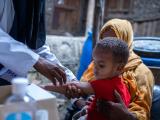May 12, 2011 (CIDRAP News) A report from the National Research Council (NRC) calls for some changes in a US Army immunization program for lab researchers who work with dangerous pathogens, saying the vaccines need to be made more accessible to civilian scientists.
The report also says the structure of the program should be modified to give civilian federal agencies a greater role in setting policies and priorities, including determining which vaccines to offer.
The Army's Special Immunizations Program (SIP) provides unlicensed investigational vaccines and licensed vaccines to both military and civilian researchers who do biodefense research on a number of pathogens, the report says. It is based at the US Army Medical Research Institute of Infectious Diseases at Ft. Detrick in Maryland.
The program was created to serve military personnel, but because of the growth of biodefense research, in 2004 it was expanded to include other government and civilian workers, the report says. It describes the SIP as "the only program in the USA, and probably worldwide, that exists to provide vaccines (both licenses and investigational) to at-risk laboratory workers and other occupationally exposed personnel working with hazardous pathogens."
But the program "has not met the anticipated need of researchers beyond the military, particularly laboratory workers involved in civilian biodefense countermeasures and public health research," the NRC says.
When the program was expanded in 2004, it was estimated that 1,000 to 5,000 workers might be candidates for vaccination, but enrollment has stayed the same, at about 600 participants per year, according to the document. This may be due to the cost to participantsabout $10,000 to $15,000 per year, plus the cost of travel to Ft. Detrick for the vaccinations.
In one of several recommendations, the report states, "Federal agency stakeholders should modify the SIP to ensure that immunizations are readily available and accessible to all at-risk research workers, including those working on civilian as well as military projects."
To address the cost problem, the NRC suggests that the government include immunization costs in its contracts and grants awarded to institutions that do biofense research. "Furthermore, establishing a limited number of satellite clinic locations could reduce travel costs for program participants," it says.
The SIP's static enrollment "may also indicate that the program does not offer vaccines against the agents of most interest to civilian biodefense researchers," the report states. The vaccines currently offered mainly reflect the needs of historical Department of Defense (DoD) research programs, which "may not match current or future biodefense needs."
The program currently offers unlicensed vaccinations against botulism, three forms of equine encephalitis (eastern, western, and Venezuelan), Rift Valley fever, Q fever, and tularemia. Licensed vaccines offered through the program include those for anthrax, hepatitis B, Japanese encephalitis, rabies, smallpox, and yellow fever.
To help ensure that the program meets evolving biodefense priorities, the NRC suggests that stakeholders, including the DoD, Department of Health and Human Services (HHS), and Department of Agriculture, should regularly assess the vaccines included and the existence and status of new vaccines.
The report says the investigational vaccines used in the program were mostly developed and made in the 1970s and 1980s under different standards than those used today. Further, some vaccines of potential value to the SIP are either in development in the United States or abroad or already licensed in other countries.
Concerning the program's governance, the NRC says the development of biodefense countermeasures extends well beyond the DoD and includes significant participation by civilian research and public health agencies.
"However, as currently structured and managed, the program appears to lack a coordinated civilian and military perspective on policy, management, and funding. Revising the governance of the [SIP] would help develop processes for shared priority-setting and operational oversight by key stakeholders from civilian as well as military agencies," the report says.
An additional recommendation says the Food and Drug Administration should explore new administrative and regulatory pathways to aid the development and licensing of SIP vaccines. "Options might include 'restricted' or 'conditional' licensure or an 'exceptional circumstances' pathway (similar to that available in Europe)," the report says.
The NRC prepared the report at the request of the Biomedical Advanced Research and Development Authority, part of HHS.
See also:
National Academies Press page for Protecting the Frontline in Biodefense Research: The Special Immunizations Program



















